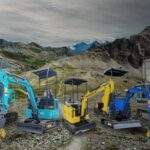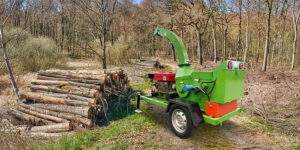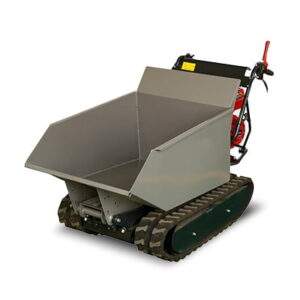The Benefits of Using a Gasoline Wood Chipper for Home Landscaping
Introduction
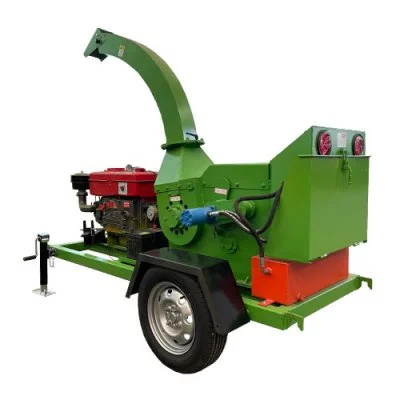
Maintaining a beautiful and functional landscape requires not only creativity and effort but also the right tools. One of the most valuable tools for managing yard waste and enhancing landscaping is a gasoline wood chipper. This blog explores the various benefits of using a gasoline wood chipper for home landscaping, including its efficiency, versatility, and impact on garden health.
What is a Gasoline Wood Chipper?
Definition and Purpose
A gasoline wood chipper is a mechanical device designed to shred and chip branches, twigs, and other woody debris into smaller pieces. Powered by a gasoline engine, it is capable of handling larger branches and more substantial volumes of material compared to electric or manual chippers. The resulting wood chips can be used for various landscaping purposes, including mulch, compost, and ground cover.
Key Features
- Engine Power: Gasoline wood chippers come with varying engine capacities, usually measured in horsepower (HP), which affects their performance and ability to handle different sizes of branches.
- Chipping Mechanism: The chipping mechanism includes blades or hammers that shred the wood into chips. The design and quality of these components influence the efficiency and quality of the chips produced.
- Feed Capacity: This refers to the maximum diameter of branches that the chipper can process. A larger feed capacity allows for handling bigger branches and reducing the need for pre-cutting.
Benefits of Using a Gasoline Wood Chipper
Efficient Yard Waste Management
One of the primary advantages of using a wood chipper is its efficiency in managing yard waste. By chipping branches and twigs into smaller pieces, you can significantly reduce the volume of waste, making disposal or recycling much easier. This efficiency is particularly beneficial for homeowners with large gardens or lots with substantial amounts of debris.
Versatility in Handling Different Materials
Gasoline wood chippers are versatile machines capable of processing various types of woody material, including branches, leaves, and even small logs. This versatility ensures that you can handle different types of yard waste without needing multiple tools or machines.
Production of Useful Mulch
The chips produced by a wood chipper can be used as mulch in your garden. Mulch helps retain soil moisture, suppress weeds, and regulate soil temperature, contributing to healthier plants and a more attractive garden.
Cost-Effective Landscaping Solution
Using a gasoline wood chipper is a cost-effective solution for managing yard waste and enhancing landscaping. Instead of hiring professional services or purchasing mulch, you can produce your own mulch and compost from the waste materials in your yard.
Reduced Need for Manual Labor
Chipping branches and debris manually can be labor-intensive and time-consuming. A wood chipper reduces the physical effort required, allowing you to complete landscaping tasks more quickly and with less strain.
Enhanced Garden Aesthetics
Properly managing yard waste and using mulch effectively enhances the overall appearance of your garden. A wood chipper helps maintain a tidy and well-organized landscape, contributing to a more appealing outdoor space.
Environmental Benefits
By recycling yard waste into mulch and compost, you contribute to environmental sustainability. Using a gasoline wood chipper helps reduce the amount of waste sent to landfills and supports eco-friendly practices in your landscaping efforts.
Types of Materials Processed by Gasoline Wood Chippers and Their Uses
| Material Type | Typical Size | Processing Details | Common Uses | Environmental Impact |
|---|---|---|---|---|
| Branches | Up to 6 inches in diameter | Shredded into small chips | Garden mulch, compost | Reduces landfill waste |
| Twigs | Up to 1 inch in diameter | Easily processed into fine mulch | Pathways, ground cover | Decreases yard debris |
| Leaves | N/A | Chipped or shredded into fine particles | Compost, mulch, soil amendment | Enhances soil fertility |
| Small Logs | Up to 4 inches in diameter | Chipped into coarse pieces | Firewood, garden borders | Reduces waste accumulation |
| Pine Cones | N/A | Shredded into smaller pieces | Mulch, decorative ground cover | Promotes garden aesthetics |
| Fruit Branches | Up to 3 inches in diameter | Shredded into fine particles | Compost, garden mulch | Enriches compost mix |
| Hedge Trimmings | Up to 2 inches in diameter | Shredded into fine mulch | Mulch, compost, garden beds | Minimizes garden waste |
Applications of Gasoline Wood Chippers
Residential Landscaping
In residential settings, wood chippers are ideal for maintaining garden health by processing fallen branches, pruning debris, and creating mulch for flower beds and garden paths.
Garden Clean-Up
During seasonal clean-ups or after storm events, a gasoline wood chipper helps manage the large volumes of debris quickly and efficiently, keeping your garden in top condition.
Composting
The chips produced by a gasoline wood chipper can be used in composting. Mixing wood chips with green waste accelerates the composting process and produces high-quality compost for garden use.
Landscaping Projects
For landscaping projects such as creating paths, garden borders, or ground cover, the mulch produced by the chipper can be used to enhance the aesthetic appeal and functionality of the landscape.
Challenges and Considerations
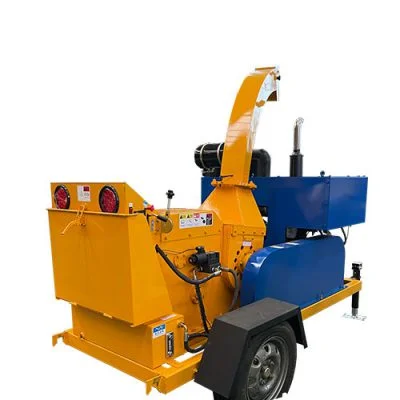
Noise Levels
Gasoline wood chippers can be noisy, which may be a concern for both the user and neighbors. Wearing hearing protection and scheduling use during appropriate times can help manage noise levels.
Maintenance Requirements
Regular maintenance is required to keep the chipper in good working condition. This includes checking the blades, changing the oil, and ensuring the engine is functioning properly.
Safety Precautions
Operating a gasoline wood chipper involves certain safety risks, such as flying debris and potential injuries. Following safety guidelines, wearing protective gear, and keeping bystanders at a safe distance are essential.
Initial Cost
The initial cost of purchasing a gasoline wood chipper can be significant. However, considering the long-term benefits and cost savings in yard waste management, the investment can be worthwhile.
Conclusion
A gasoline wood chipper offers numerous benefits for home landscaping, from efficient yard waste management and versatile material handling to producing useful mulch and reducing manual labor. While there are considerations such as noise levels and maintenance requirements, the advantages of using a gasoline wood chipper make it a valuable tool for homeowners looking to enhance their landscaping efforts. By investing in a gasoline wood chipper, you can achieve a healthier, more beautiful garden and contribute to environmentally sustainable practices.
FAQ
What size branches can a gasoline wood chipper handle?
The size of branches a gasoline wood chipper can handle varies by model, with capacities ranging from 2 to 6 inches in diameter. Always check the specifications of the chipper you are considering.
How often should I maintain my gasoline wood chipper?
Regular maintenance is crucial for optimal performance. It is recommended to check and service the chipper after every few hours of use, including inspecting the blades, changing the oil, and cleaning the air filter.
Are gasoline wood chippers noisy?
Yes, gasoline wood chippers can be noisy. Wearing hearing protection and operating the chipper during acceptable hours can help manage the noise levels.
Can I use the chips produced by the wood chipper as mulch?
Yes, the chips produced by a gasoline wood chipper are excellent for use as mulch in gardens, flower beds, and pathways. Mulch helps retain soil moisture and suppress weeds.
What safety precautions should I take when using a gasoline wood chipper?
Safety precautions include wearing protective gear, such as gloves and safety glasses, keeping bystanders away from the operating area, and following the manufacturer’s safety guidelines.
How does a gasoline wood chipper compare to an electric model?
Gasoline wood chippers generally offer more power and can handle larger branches compared to electric models. However, they can be noisier and require more maintenance.
Can I use a gasoline wood chipper for composting?
Yes, the wood chips produced by the chipper can be used in composting. They add carbon to the compost mix, which helps create high-quality compost for garden use.

